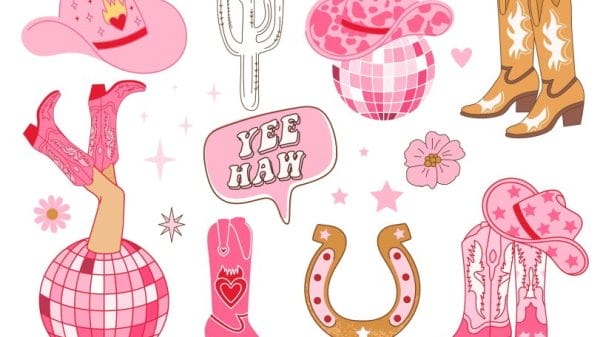Generation Alpha is defying traditional age norms, with the rise of kid influencers gaining traction on various social media platforms. However, the question arises: is pursuing an influencer career suitable for children? As our understanding of the risks associated with social media deepens, the answer leans towards a resounding no.
On January 22, a TikTok creator, the Garza Crew, shared a video featuring the hashtag ‘Gen Alpha Influencers’. The clip rapidly gained traction as numerous TikTok users began critiquing this emerging trend of influencers who often fall under the age of ten.
During Christmas and New Year’s in 2023, social media was flooded with Christmas gift hauls on TikTok, YouTube, and Instagram. While witnessing children unwrap presents is usually a hope-core moment, the previous year’s gift trends left many feeling perplexed rather than uplifted.
Skincare and Stanley cups
Video after video, I watched young girls unwrap Stanley cups and Drunk Elephant skincare products with evident excitement. Yet, as they tore through reindeer-patterned wrapping paper to reveal a metal tumbler or bronzing drops, I found myself reminiscing about my own childhood holiday experiences.
As a kid, my siblings and I eagerly unwrapped Barbies, American Girl Dolls, and the latest toys on Christmas morning. We reveled in the hours of fun that followed each discovery. This sentiment likely resonates with many Gen Z peers and older generations. Everyone remembers the thrill of waking up to discover what Santa had brought.

So, how did we shift from toys to tumblers and skincare? According to a Business Insider article, the Stanley Cup has emerged as a status symbol within schools. Children who are unable to afford the latest expensive items are left feeling ostracized for not having the brand-name version. Moreover, the recent surge of young shoppers at Sephora has left the makeup chain’s shelves in disarray, so much to the point that the stores have to change how they operate, affecting the shopping experience for all. Childhood experiences are evolving in the modern era, and they are beginning to promote adult activities as kids find the urge to grow up faster than they should.
Looking at preteen girls online today, it’s impossible to know anyone’s age. A recent trend on TikTok seems to suggest that Gen Z is the oldest-looking generation. It looks as though Generation Alpha will top that. With the various makeup and skincare crazes, the younger generation is often buying into these trends. They purchase extremely expensive makeup and skincare, which they do not need at their age.
There is plenty of evidence to suggest many of these products are harmful to underage skin. There is no harm in having a skincare regime, but no little girl needs retinol serums and hyaluronic acid masks. Young skin doesn’t need the harsh chemicals used by some of the popular skincare brands. Though beneficial for aging skin, the ingredients can provoke eczema or allergies in kids.
Social media: an unsurprising culprit
The apparent culprit behind this phenomenon is none other than social media, often dubbed the root of all evil. It is easy to come across instances of Gen Alpha influencers endorsing products spanning from hair dryers to makeup.
Accounts like the Garza Crew are just one among numerous platforms showcasing pre-teens’ skincare routines and “get-ready-with-me” videos. Moreover, one can find videos glamorizing their lifestyle, which is often just a show put on for a camera. This especially pertains to younger influencers.
Many of these videos appear innocuous at first glance as they put on their on-screen personas. These videos depict young girls discussing relatable issues like school troubles while applying mascara or showcasing their outfits of the day. However, there is an underlying sinister aspect to these social media accounts.
Kid influencers are profitable for all the wrong reasons
As highlighted in the New York Times article, “A Marketplace of Girl Influencers Managed by Moms and Stalked by Men,” many of these young girls are too young to manage their own social media accounts. Instagram and TikTok, for instance, have a minimum age requirement of thirteen.
In the case of the Garza Crew, Andrea Garza, the mother of the children, manages the account. Andrea frequently appears or is heard in the videos, actively supporting her children’s rise to fame and aiding in content creation.

However, it is crucial to acknowledge the findings reported by the Times, which examined thousands of similar accounts. According to calculations by an audience demographics firm, there were 32 million connections to male followers across 5,000 of these accounts.
The disturbing reality is that social media platforms can become hunting grounds for predators and individuals with malicious intents. This isn’t a new revelation, as creeps and pedophiles have long turned to social media to target children.
Dr. Leslie Dobson, a clinical and forensic psychologist, recently garnered attention with a viral TikTok advocating for child protection. Drawing from her professional experience, Dr. Leslie reveals that when there is a restriction on access to child pornography, some predators resort to engaging with young influencers online.
Childhood stardom has always been a controversial topic as it is up for debate whether or not children can consent to being in the limelight. Even for those who do initially consent, there is also a question of whether they realize the full extent of being in the public eye. Other than being famous and making a profit, there are just as equally as many negatives that these children are not always aware of.
In an NBC article, the topic is discussed in further detail. Particularly, how difficult it is for children to consent to being online. As the topic gains interest, the government is also beginning to take an interest. However, Illinois is the only state to enshrine child influencer protections into law as it entitles children to a percentage of their earnings from monetized online content. In addition, the California Senate recently passed a similar bill. Moreover, legislators in other states are hoping to do the same soon.
Tackling the real issue with kid influencers
However, does this law address the real issue? Children being entitled to a percentage of earnings isn’t seen to be enough to disincentivize children from becoming influencers. Based on what we’ve learned about the dangers of social media and digital footprints, shouldn’t the real goal be to keep children off the platforms?
We can’t rely on the creators of these platforms to protect children from the harmful impacts of social media. Meta and Zuckerberg were sued in December, as New Mexico’s attorney general alleged that Facebook and Instagram were “prime locations” for predators who engaged in sexual abuse, solicitation, and trafficking.
Protecting children from online predators will become more difficult as AI progresses. The Stanford Internet Observatory found more than 3,200 images of suspected child sexual abuse in the giant AI database LAION, an index of online images and captions that’s been used to train leading AI image-makers such as Stable Diffusion. (AP News, 2023)
There are other internet threats to kid influencers
Protecting children from predators is only one part of the equation. Cyberbullying and the unachievable online beauty standard fueled by photoshop and cosmetic procedures have resulted in the most mentally ill generation yet.
In addition, Instagram is known for its harsh commenters as the comment section in the app is a brutal place. Children in the public eye are often the targets of intense cyberbullying.
Rosie Mcclelland, from the internet sensation Sophia Grace and Rosie and a kid influencer, spoke on This Morning about her own experience with online bullying. Rosie posted a video about her GCSE results in 2023, which went viral. As a result, she was targeted by thousands of online trolls.
Another threat to kid influencers is stalkers. Ava Majury blew up on TikTok at thirteen years old for participating in the app’s dance trends. One fan became so obsessed with Ava that he showed up, armed, at her home in Florida. Thankfully, Ava’s father was able to stop the stalker. Currently, Ava uses her platform to spread awareness about the potential consequences of internet fame.
With so many dangers lurking online, many adults are becoming more aware of their digital footprint. Once something has made its way onto the internet, it is there forever. If kids can’t consent to a permanent tattoo, how can they consent to a permanent internet presence?
What is the solution to the kid influencer issue?
Social media makes grownups insecure, jealous, and depressed. It used to be hearsay that social media was the root of all problems. Now, we have studies showing that social media is, in fact, generally bad.
There is no excuse for kids having social media. Whether these parents are naive, money-hungry, or neglectful, their children will suffer the consequences. Wake up, parents. Take the phones and tablets away. The internet is not a suitable babysitter. There are disgusting people online waiting to prey on your kid.
At some point, your child might need the internet, as it is an unavoidable source in our daily lives. There are plenty of options to protect kids from unsafe content. Parents should do their best to monitor kids whenever they’re online, even if safeguards are in place.
Kids should have the opportunity to be kids. Your thirteen-year-old doesn’t need to be the next big internet sensation. They need the opportunity to be themselves without the whole world watching. Children need to be able to make mistakes without their mishaps living online forever. Who your child is as a person should be shaped and molded over time, not influenced by social media.














